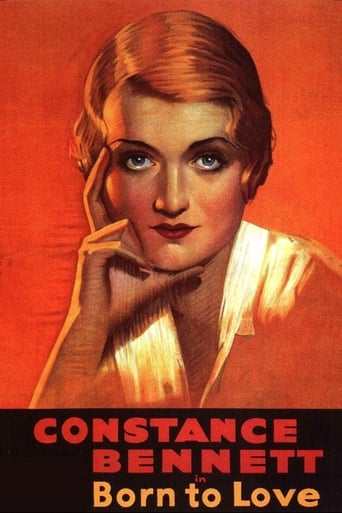marcslope
Not uninteresting pre-Code soap suds, wherein Yankee nurse Bennett, in London (nice historical touch: a bus advertising "Chu Chin Chow") meets Captain Joel McCrea, they have a torrid romance and pledge their troth, and while carrying his child she hears he's dead. We know he's not--he's second-billed, and there's an hour to go--but she thinks he is, so she marries Paul Cavanagh on the rebound and we wait for the fireworks that will erupt when McCrea returns. Connie's histrionic- -she gets to love, yell, sob, scream, and put on a phony British accent, even though she's playing American--and Paul Stein's camera likes to linger on her overemoting. But Joel McCrea was certainly the personification of solid masculine American values circa 1918 or 1931, and his sincere underplaying nicely complements her overplaying. The screenplay doesn't hate her for having a child out of wedlock, and the happy ending isn't that happy. So, by 1931 standards, it's an adult movie. Just not a very good one.
judy t
They don't make 'em like this anymore. But the weeper genre was popular with the ladies once upon a time, and Bennett led the pack of martyrs. Her suffering in Born to Love is all the sadder because it could have been so easily avoided if she had just answered her husband's questions frankly and fully. But not Bennett. Her evasiveness followed by her unforgivably cruel words turned this kindly man's love for her into hate. But still, she didn't deserve what she got.Variety's reviewer wrote of the plot, "Constance Bennett is ruined again and has another baby" and "How the women love it, that sobbing stuff." Bennett's hand-wringing and heavy emoting was criticized, but I thought her acting was exactly how her character would respond to the shocks the script writers threw at her. Regardless, Variety saw the film's box-office potential, "Bennett isn't much of an actress here but still drawing as ever because of this story." Only a year after this huge hit, the drawing power of Bennett and stories like Born to Love would lose favor with fickle moviegoers, and she and her producers were unable to keep her career from sliding downhill until Topper reinvented her as a sophisticated comedienne.This was Joel McCrea's first (of 4) teamings with Bennett as well as his first major role. He's wonderful to watch and Bennett's undying love for him is believable. Cavanaugh is excellent and manages to be sympathetic even while being cold-hearted and vengeful.
calvinnme
I really love Constance Bennett and Joel McCrea and their underrated talent and range, but this film was just one emotional blow after another to Bennett's character, Doris Kendall, a nurse in Great Britain during World War I, to the point where it got hard to continue watching. The film starts out on a rather fascinating note - Doris is practically hypnotized by the sight of a German dirigible in a rather strange "dogfight" with British planes over London. Down goes the dirigible in a pile of flames.Joel McCrea's character, Captain Barry Craig, pulls Doris out of danger and sparks begin to fly. At the same time, Doris is nursing an English nobleman (Paul Cavanagh as Sir Wilfred Drake) back to health from his war wounds and he has fallen in love with her. Captain Craig and Doris throw convention to the wind and spend one night together and consummate their relationship before he has to ship out to France. Then one tragedy after another ensues, some due to misunderstandings, some due to natural occurrences, and some due to divorce law in England as it stood in the early twentieth century in which one of the parties had to be the bad guy in order for divorce to occur with legally punitive measures taken against the party that is deemed to be "at fault".This movie may costar McCrea, but this is really Constance Bennett's film all the way. Frederick Kerr is particularly noteworthy as an older member of England's upper class that has a crusty exterior that hides a gooey center - he's quite sympathetic and kind to Doris. Louise Closser Hale plays his wife who also has a crusty exterior but has a heart of - well - crust. In spite of these differences in viewpoint these two older members of the cast play off one another quite well.Recommended, but not if you're looking to be cheered up.
[email protected]
In BORN TO LOVE, Constance Bennett (Doris) and Joel McRea (Barry) are lovers who meet during the last weeks of the First World War. London is portrayed as a city in imminent danger of bombs from aircraft. They meet and predictably fall in love despite the chaos and confusion that surround them. There is an interesting scene in which they make love, one that is prudishly suggested off screen, yet one that in just a few years would have been banned by Hollywood as overtly salacious. The plot is the contrived package of Barry's reported death, forcing Doris to marry another. The second half of the film is less melodramatic and more of an acerbic commentary on the harshness of an English divorce system that allows a rich and titled husband to retain custody of a child over the wishes of a impecunious mother. There is an encoded ideology in the film that does not hide the fact that poor women who marry titled men can expect no mercy or kindness from a patriarchal legal system. BORN TO LOVE nevertheless carries the audience to a satisfying if not predictable conclusion of the need for true love to triumph over formidable societal obstacles.


